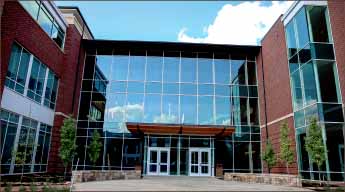Liberty readies for reaccreditation by implementing Quality Enhancement Plan
Liberty University will be implementing a Quality Enhancement Plan (QEP), “Illuminate: Cultivating a Community of Research” in the spring, which is a necessity for the institution’s 10-year reaccreditation plan through the Southern Association of Colleges and Schools Commission on Colleges (SACSCOC).

BETTER — The first school to receive QEP benefits is the school of health sciences. Photo credit: Leah Seavers
The QEP is a plan designed to “enhance student learning,” according to the plan’s director, Elisa Rollins. In order to undergo the accreditation process, the SACSCOC wants to see that Liberty is continually improving the state of overall student learning with an effective plan. The QEP is one of the major methods used to ensure this end.
“(The SACSCOC doesn’t) want it to be some plan that’s way up in the air,” Rollins said. “They want it to be something that students know about, get excited about, and see the benefits of.”
Such benefits in the case of the QEP would include more opportunities for undergraduate students to develop and apply new skills in research and scholarship.
Simply visiting a library and printing an article may pass as research for many students, but Rollins hopes students will soon learn the broader spectrum of research in its totality.
“There are a lot of different levels to research that we want students to understand as a very interactive process,” Rollins said, citing possibilities of faculty mentoring students under QEP.
The coming QEP will focus mainly on undergraduates, based on data derived from varied surveys, assessments and information literacy tests. QEP will be implemented in five schools within Liberty throughout the first five years of the plan. The first school receiving QEP benefits will be the school of health sciences. The plan will gradually progress to the other schools.
Specific implementation of the QEP, according to Rollins, involves curricular actions and co-curricular actions.
A prominent curricular action within the QEP will be the addition of a “Twenty-first century researcher” course, in which faculty members themselves will personally teach and mentor students in research, directing them through a multiple-semester research project.
As an additional curricular action within QEP, students will experience further introductions to information literacy and research skills from certain 100- and 200-level courses within the students’
given disciplines.
Co-curricular options exist within QEP as well. One is the upcoming Research Week in March, and the other is future student research societies.
The research societies will be similar to other official student clubs at Liberty, only more markedly research-focused.
“The QEP ‘Illuminate’ will support the establishment of student research societies in a variety of schools and college,” Rollins said.
The other co-curricular of QEP will be Research Week, which takes place March 29-31, 2016. It will be a symposium featuring student exhibitions, a keynote speaker and a rewards reception. SACSCOC representatives will also be present for an on-site visit.
QEP will officially be implemented after Research Week.
As an official part of QEP, there will also be a new Center for Applied Research & Scholarship. It will serve as the primary vehicle through which QEP is implemented on Liberty’s campus. The center will be the focal hub of collaboration on campus research.
“It’s going to be quite a bit of collaboration across campus, which we’re excited about,” Rollins said. “It gives us a lot of opportunity to take the expertise of each university organization and coordinate it all together to promote research and scholarship.”
Aside from hoping students learn the fundamentals of technical research, Rollins also hopes students learn the fundamentals of the spirit of scholarship within research.
“Scholarship is taking the knowledge you have discovered through your research and making it available to others,” Rollins clarified. “You’re doing the giving. You’re sharing your knowledge.”
Rollins further acknowledged that an important part of the QEP, one being unique to Liberty, is presenting learning and research within the context of a Christian worldview — not just in terms of research but also in taking interest in what is happening out in the rest of the world.
“A researcher with a Christian worldview is motivated to conduct research and seek after new knowledge for the purpose of knowing God,” Rollins said. “God created the world around us, and (has) given us a mandate to take care of it and to cultivate it. Through investigation of the problems and complexities in the world around us, we have the opportunity to know God better through the inquiry of creation and to find ways to use this new knowledge to impact the world for his glory.”
Jarrett is a news reporter.